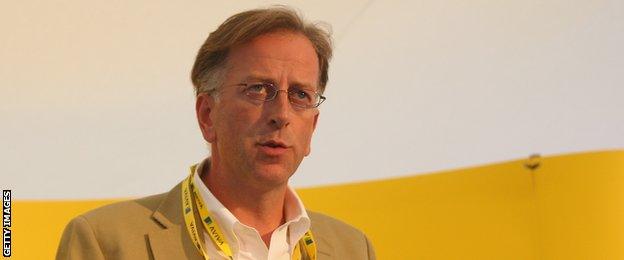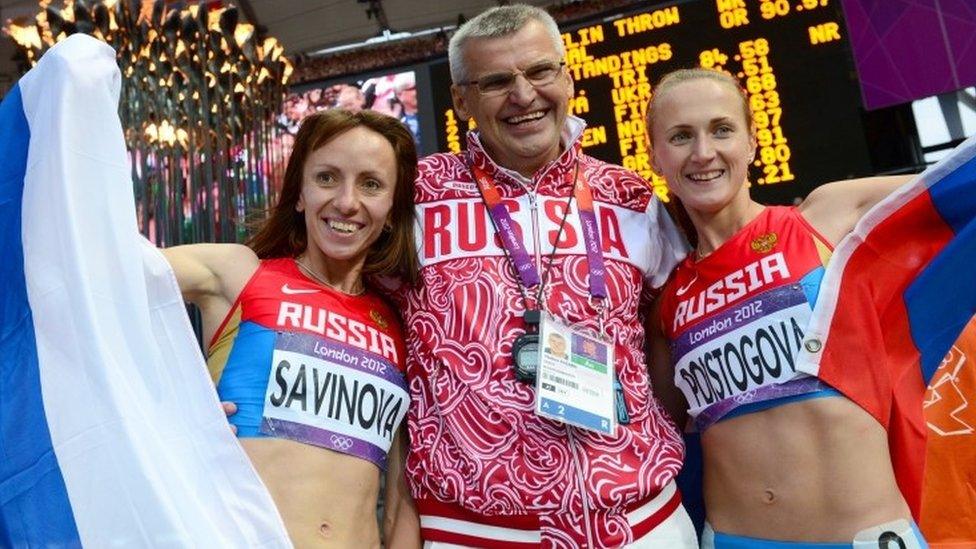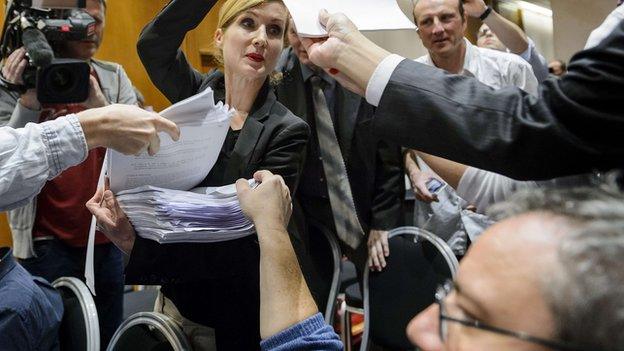Athletics doping: Russia not the only country involved - Ed Warner
- Published
Russia doping crisis in 60 seconds
Russia is not the only country with systemic doping problems, says UK Athletics chairman Ed Warner.
A World Anti-Doping Agency commission report has accused Russia, external of running a "state-sponsored" doping programme.
And Warner said he feels sports other than athletics have reason to be concerned at how Russian sport is run.
"This iceberg spreads in two different directions," he said. "I suspect there are probably four, five or six nations that athletics has a problem with."
Commission chairman Dick Pound said Russia's athletics federation, Araf, should be banned from the Rio 2016 Olympics.
Warner told BBC Radio 5 live: "Every other international sport today should be looking at Russian sport and looking at whether the men and women who compete in their events are clean."
"They do not have robust anti-doping regimes. They are asleep on the job - and they have to be rooted out."
Wada's independent commission, which examined allegations of doping, cover-ups and extortion in Russian athletics, also implicated the International Association of Athletics' Federations.
The IAAF's former president Lamine Diack has been provisionally suspended, external by the International Olympic Committee, who have also asked the IAAF to start disciplinary action, external against the athletes named in the report.
Araf has been told to respond to the report by Friday and Russia have defended their position.
Acting head of Russia Athletics Federation, Vadim Zelichenok, said: "There is an element of a political hit job here because quite a few things were described in the report in a biased way."
Russia's sports ministry has said it will work more closely with Wada,
Igor Zagorskiy, deputy director of the Russian Anti-Doping Agency, Rusada, told the BBC: "There is always room for improvement.
"We are on that track and we've been on that track together with Wada. We will continue this work on this."
Warner says the International Association of Athletics Federations (IAAF), must be restructured to combat the problem.
He revealed that he had spoken to IAAF president Lord Coe since Monday's publication of Wada's independent commission, which examined allegations of doping, cover-ups and extortion in Russian athletics, and also implicated the IAAF.
'Other nations to root out'

Ed Warner has backed calls for Russia to be suspended from competition
The 323-page report said that "acceptance of cheating at all levels is widespread" in Russia and suggested that neither Araf, Rusada, nor the Russian Federation can be considered anti-doping code-compliant.
The report also said the London 2012 Olympics were "sabotaged" by "widespread inaction" against athletes with suspicious doping profiles; accuses Moscow laboratory director Grigory Rodchenko of asking for and accepting bribes and intentionally destroying samples he was told to keep; and recommends that five Russian athletes and five coaches should be given lifetime doping bans.
Russian doping 'worse than thought'
Pound, who chaired the Wada investigation, said the situation was "worse than we thought", adding that "it may be a residue of the old Soviet Union system".
Warner backed the recommendation to suspend Russia from competition "until they put their house in order", adding: "If you punish one or two innocent Russian athletes for the greater good of the sport, that is a moral dilemma I am willing to grasp."
He also suggested that Russia is unlikely to be the only country guilty of doping, saying that "athletics has probably got some other nations to root out".
He added that while "there are undoubtedly drugs cheats in many corners of athletics", he believed systemic doping did not occur in nations in the Western world.
'Change has to happen now'
During a special BBC Radio 5 live programme examining the independent report, Britain's marathon world record holder Paula Radcliffe said: "I don't think anyone is under the impression it's only Russia."
On the same programme, former British sprinter Darren Campbell warned of "darker days to come".
He said: "This report was about Russia, and they need to be punished if this holds up, but we'll lose sight on the bigger issues if we focus on Russia. It's about cleaning everything out.
"There's people talking about testing out in Kenya and Jamaica. We can't have rumours anymore.
"We need to understand how the Russians got away with it. How did this happen yet nobody knew?
"No matter how dark and depressing it gets, change has to happen now."
'This cannot be a one-man crusade'
Coe, elected IAAF president in August, described the Wada report as "alarming" and has said he will seek urgent approval from members to consider sanctions against the Russian federation.
The report found evidence of multiple rules breaches by IAAF officials and found the governing body to be "inexplicably lax in following up suspicious blood (and other) profiles".
Lord Coe: "If there are lessons to be learned, if there are failings in our systems...then I have to fix it"
It has also been criticised for its handling of the allegations, with Coe himself describing claims about suspicious blood profiles involving some athletes as "a declaration of war on my sport" in August.
On Monday, Coe said that "if there are failings in our governance or our anti-doping programme I will fix them".
But Warner says Coe needs to restructure the IAAF in order for it to effectively tackle the problem.
"This cannot be a one-man crusade," Warner told BBC Radio 4's Today programme. "He needs to ensure there is a bench around him at the IAAF who dramatically improve the operation.
"We all know, and he has already said, he needs to go out and hire a good chief executive.
"It needs more than that. He also possibly needs a chairman under him so he can take the lead of the elected council and be the ambassador for the sport and have full-time professional staff, possibly from outside sport, from elsewhere in business, who can get a grip on the organisation."
- Attribution
- Published10 November 2015

- Attribution
- Published10 November 2015

- Published10 November 2015
- Published9 November 2015
- Published9 November 2015

- Published8 February 2019
